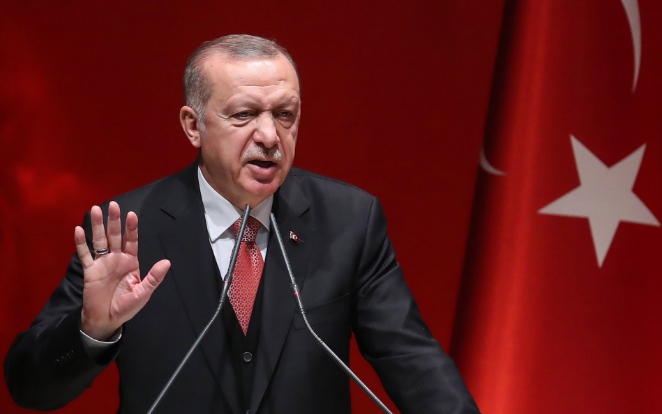Turkey Accuses Israel of Undermining Syrian Transition During Antalya Forum
By Kardo Roj
ANTALYA, Turkey (North Press) – Turkish President Recep Tayyip Erdoğan intensified his rhetoric against Israel on Friday during the Antalya Diplomacy Forum (ADF2025), accusing Tel Aviv of attempting to derail Syria’s post-conflict transition by fueling sectarian and ethnic divisions.
Speaking at the high-profile forum held in southern Turkey’s Antalya province, Erdoğan claimed that Israel has been “provoking minorities and inciting divisions” in Syria to weaken what he termed the “December 8 Revolution,” a reference to the transitional phase following the fall of former President Bashar al-Assad.
“These Israeli attacks on Syria are unjustified,” Erdoğan said, alluding to a series of recent airstrikes attributed to Israel in various parts of Syria, including the south and near Damascus.
Erdoğan’s remarks come amid the participation of Syria’s Interim President Ahmad al-Shar’a at the forum, highlighting the Syrian file’s growing prominence in regional diplomatic discourse.
Erdoğan’s speech coincided with ongoing, though reportedly strained, consultations between Turkish and Israeli officials in Azerbaijan. The talks, set to continue through April 19, were aimed at establishing a conflict-prevention mechanism for operations in Syria, particularly given the increasing overlap of both countries’ strategic interests.
Israeli public broadcaster Kan reported that the initial rounds of discussion failed to overcome major disagreements, underscoring persistent mistrust and competing objectives. Turkey has long opposed Israeli military presence and operations in Syrian territory, while Israel justifies its actions as preemptive measures against Iranian entrenchment.
While Erdoğan’s assertions have drawn attention, analysts caution that such public statements are often calibrated for domestic and regional audiences, particularly amid shifting alliances in the Middle East. Nonetheless, the escalation underscores the complexity of the Syrian conflict, where multiple international actors pursue divergent agendas, often at the expense of long-term stability.
Though Erdoğan did not reference northeast Syria directly in his speech, developments in the region remain central to any broader geopolitical recalibration. The Autonomous Administration of North and East Syria (AANES), backed by the Syrian Democratic Forces (SDF), continues to administer vast territory with a focus on inclusive governance and counterterrorism operations against Islamic State (ISIS) remnants.
Observers note that accusations of incitement and division have historically been used by regional powers to frame their military and political interventions. In contrast, AANES has emphasized interethnic cooperation, civilian representation, and stability as its core pillars—elements that have earned it cautious support from international actors concerned about the resurgence of extremist groups.
Erdoğan’s emphasis on external meddling also comes at a time when new security arrangements are reportedly under consideration between Damascus and Ankara. While details remain undisclosed, such discussions could potentially affect areas currently administered by AANES and secured by the SDF, raising concerns about the future of local governance and humanitarian access.
The Antalya Diplomacy Forum, organized under Turkish state patronage, is positioning itself as a major regional platform for dialogue and power projection. With high-level delegations from across the Arab world, Europe, and Asia, the forum seeks to promote diplomatic engagement in an increasingly fragmented international landscape.
This year’s theme, “Embracing Diplomacy in a Divided World,” reflects the complex fault lines running through the Middle East. For Syria, whose political future remains uncertain, the forum serves as both a diplomatic stage and a battleground for competing narratives.
As regional powers continue to assert their influence over Syria’s evolving political trajectory, statements like Erdoğan’s may signal a tougher line in bilateral and multilateral settings. However, lasting stability in Syria will depend not only on high-level diplomacy but on inclusive political solutions that address the diverse realities on the ground.
The AANES and SDF remain key players in ensuring security in vast stretches of northeast Syria. Any durable resolution to the Syrian crisis will require recognizing and integrating their role within broader peacebuilding and state-reconstruction efforts—an aspect yet to be fully addressed in regional forums.

